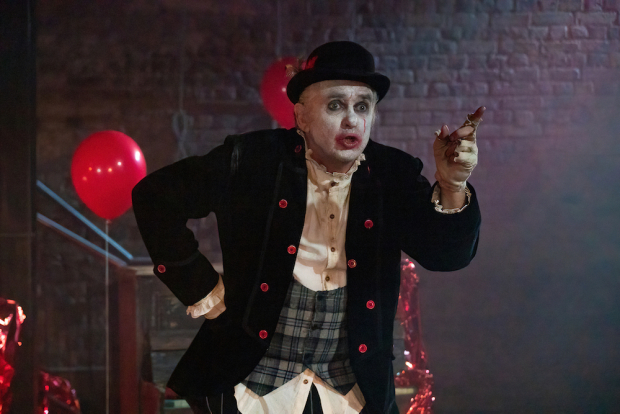Review: Scaramouche Jones or the Seven White Masks (Stream Theatre, online)
Shane Richie stars in a digital revival of Justin Butcher’s one-man play

© Bonnie Britain
The writers of monologues have enjoyed a boom season over the past year. As makers of theatre have struggled to fill our minds with something to make up for the absence of live performance, the one-person show has become the vehicle of choice. But in dusting off this offering from 2001, Shane Richie has unearthed a curate's egg rather than a shining jewel.
The former EastEnders star plays Scaramouche Jones, a clown who has lived 100 years and suffered the slings and arrows of the century that has unfolded around him. Now, on the New Year's Eve of the Millennium, he is waiting to die. Justin Butcher's play was first seen at the Dublin Theatre Festival where Pete Postlethwaite played the character who peels back the seven masks that cover his face.
Born the illegitimate son of a gypsy prostitute at midnight on December 31, 1899, he slips into the world like a "little white oyster" at the death rattle of the 19th century, is orphaned, exiled and sold into slavery in a single day, grows up as the apprentice of a snake charmer with a great white cobra called "Benjamin Disraeli" at his beck and call, goes to a masked ball with Mussolini before falling in with gypsies and ending up in Croatian concentration camp, digging mass graves.
Around his colourful, sometimes comic, usually tragic life, history whirrs, and masks of sorrow and joy shape his face and his character. The most impressive section is when he recalls making the children facing death laugh, as they stand on the edge of the pit he has dug; at that moment, the play seems to have something to say about the power of a clown to stand for everyone, to offer hope in darkness.
Only in this production it doesn't because Richie's words, delivered with some emotion and power, are almost completely drowned out by the loud music that insistently tells us what to feel. In Ian Talbot's production, filmed in a London theatre, with crumpled red cellophane, red balloons and faded posters advertising "the greatest clown in the world" as a set, the soundtrack constantly intrudes.
In this context, Richie, who occasionally delivers his lines to the camcorder that is supposedly recording the last night of his life, and that crackles with static between scenes, decides to go big, making his delivery orotund and poetic to match the consciously theatrical style of Butcher's script. Yet his most effective moments are those at which he is at his most natural and quiet; recalling the gypsy girl he tries to save, remembering "the beautiful yellow stars" on the clothes of Jewish travellers when they are on their way to the concentration camp.
Under it all runs a thread about Englishness; Scaramouche is always searching for his English father and is continually saved by "the exceptional whiteness of my face". He ends up discovering the joy of laughter, among "the discarded sons of England." Yet the theme is skimpily developed and feels like one of many odd thoughts that never cohere in this strange, unsatisfactory piece.












